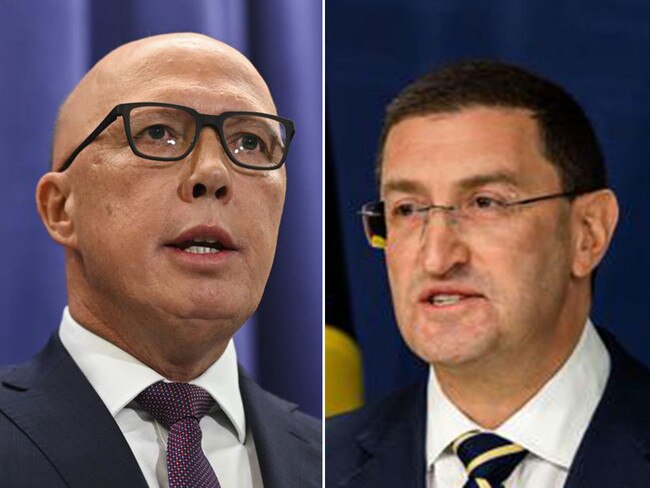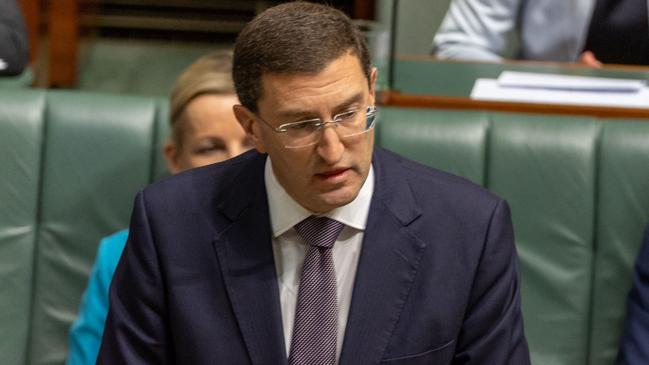Dutton downplays frontbench fractures as Julian Leeser quits over Voice stance
As senior Liberal MP Julian Leeser quits the frontbench over his party’s opposition to the Voice referendum, Peter Dutton accuses Labor of “personal attacks” and demands the PM apologise.
National
Don't miss out on the headlines from National. Followed categories will be added to My News.
Opposition leader Peter Dutton has downplayed the decision by senior Liberal MP Julian Leeser to quit the frontbench to campaign for the Voice, and instead demanded the Prime Minister “apologise” to the former shadow minister.
Mr Leeser resigned as shadow Attorney-General and shadow Indigenous Australians minister on Tuesday and moved to the Liberal backbench as a “point of principle” on the Voice, confirming while he would advocate for his preferred changes to the proposed constitutional amendment establishing the advisory body, he would still ultimately join the “yes” campaign.
Mr Dutton said Mr Leeser’s departure from the shadow ministry was simply a reflection of the fact his position on the Voice did not align with the majority of the federal Liberal party room.
“As Julian has laid out, his position is at odds to the … overwhelming majority of … our party room,” he said. “We respect that.”
Mr Dutton said he bore no ill-will toward Mr Leeser, and confirmed a cabinet reshuffle to replace him on the frontbench would be considered in the next “few days or (a) week or so”.

Mr Dutton instead focused his criticism on Labor and Anthony Albanese, who he accused of launching “disgraceful” and “personal attacks” at Mr Leeser.
“People, including the Prime Minister should apologise to Julian Leeser,” he said.
LEESER TO CAMPAIGN FOR ‘YES’ VOTE
Mr Leeser quit over his party’s rejection of the Voice referendum, formally announced his resignation from Opposition leader Peter Dutton’s shadow cabinet at a press conference in Sydney on Tuesday, saying he believed the “time for the Voice has come”.
“I will support the referendum being put this year,” he said.
“I intend to campaign for a ‘yes’ vote.”

Mr Leeser said he supported Mr Dutton’s leadership, but wished to become a backbencher in order to exercise the “freedom” the party grants them “to champion the ideas they believe in”.
“I resign without rancour or bitterness and remain a loyal Liberal, fully committed to the leadership of Peter Dutton,” he said.
Mr Leeser said as a conservative he believed giving Indigenous Australians a Voice would deliver practical outcomes for communities.
“I believe that by empowering people and building responsibilities that shift responsibility and decision-making closer to people, we’re more likely to shift the dial on Indigenous health, education, housing, safety and economic advancement,” he said.
Mr Leeser has been a long time proponent of an Indigenous Voice to Parliament, but has raised concerns about the final wording of the proposed constitutional amendment and the broader process undertaken by the Albanese Government in recent months.


“I believe that the government must seriously engage with Coalition voters and it hasn‘t done so to date and this failure could ultimately put the referendum at risk,” he said.
Mr Leeser said the Voice was not about “special privileges”.
“It’s about recognising … that Indigenous Australians are our brothers and sisters, and we have left them behind in our shared national project,” he said.
“This is a choice for every Australian and we must all work to find common ground to put the referendum on a more secure path and to win together later this year.”
Mr Leeser said though his title was changing, his work would not.
“I’m still the Liberal member for Berowra, I love our party and I love our community,” he said.
Every Australian will be required to vote in a referendum later this year proposing to recognise Aboriginal and Torres Strait Islander people in the constitution and enshrine a permanent advisory body known as a Voice.

The Voice would be a group of Indigenous Australians able to advise and make representations to the parliament, government and public servants on issues that impact Aboriginal and Torres Strait Islander people.
If the referendum passes, the Voice would then be established by the parliament following a series of design principles, including that the group has no veto power over government and no ability to administer funds or run programs.
Labor, the Greens, all of the “teal” independent MPs and others including Helen Haines, Andrew Wilkie and Rebekha Sharkie support the Voice, while the Liberals and Nationals, as well as independent Senator Lidia Thorpe do not.
Leading “no” campaigner and NT Senator Jacinta Nampijinpa Price said Mr Leeser’s frontbench resignation was a “dramatic” step, but consistent with his views.
Ms Price said Mr Leeser had shown himself to be “considered and knowledgeable on Indigenous Affairs”.
Opposition home affairs spokeswoman Karen Andrews said she was “very disappointed” when she heard about Mr Leeser’s resignation, describing him as a “valued member” of the front bench.

Ms Andrews said while it may seem “harsh” to bind shadow ministers to a party room position, Liberal leadership needed to be “cohesive”.
Liberal Senator Andrew Bragg, who supports the Voice, said he believed a successful “yes” outcome was more likely following Mr Leeser’s decision.
“Julian has always understood a successful referendum would be considerably more likely with Liberal and conservative support,” he said.
“This referendum is too important to play politics and it is not good enough to oppose the referendum on process grounds.”
Fellow Voice supporter, Liberal MP for the Tasmanian seat of Bass Bridget Archer, said she had “much respect” for Mr Leeser, describing his move as one of “courage and integrity”.
Following the Liberals’ decision to oppose the Voice, former Indigenous Australian Minister Ken Wyatt resigned his party membership.
Last year when the Nationals party room decided to oppose the Voice, Calare MP Andrew Gee quit and moved to the crossbench as an independent.
Tasmanian Premier Jeremy Rockliff is the most senior Liberal leader in the country who supports the Voice.
Read related topics:Peter Dutton





